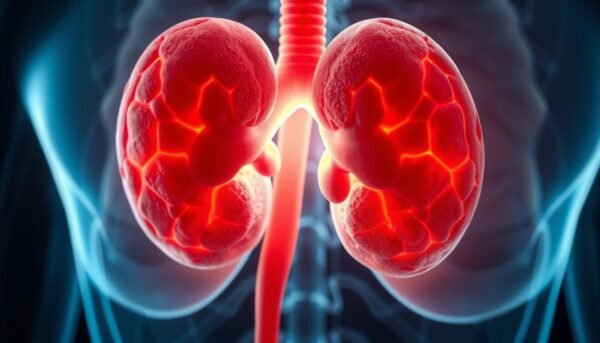This post may contain affiliate links which means I may receive a commission for purchases made through links. I will only recommend products that I have personally used! Learn more on my Private Policy page.
Do you feel tired all the time, even after sleeping well? You might have heard of “adrenal fatigue.” It’s not a real medical term but describes symptoms from too much stress. So, what is adrenal fatigue, and how can you beat it?
Adrenal fatigue happens when we stress our adrenal glands too much. These glands make hormones like cortisol when we’re stressed. Too much stress can make them tired, leading to hormonal problems and symptoms like tiredness and weight gain.
Understanding Adrenal Fatigue and Its Impact on Health
The adrenal glands sit on top of our kidneys. They help our body deal with stress. They make hormones like adrenaline and cortisol. But, too much stress can make them tired, leading to adrenal fatigue.
The Role of Adrenal Glands in Your Body
The adrenal glands are small and sit on top of the kidneys. They make hormones like adrenaline and cortisol. These hormones help us handle stress, control blood pressure, and keep our immune system strong.
Difference Between Adrenal Fatigue and Adrenal Insufficiency
Adrenal fatigue and adrenal insufficiency are different. Adrenal insufficiency is a serious condition where the glands don’t make enough hormones. Adrenal fatigue is thought to be a milder version caused by too much stress.
The Stress-Adrenal Connection
Stress and adrenal glands are closely linked. Too much stress can wear out the glands. This can cause symptoms like tiredness, mood swings, and trouble recovering from illness.

Common Signs and Symptoms of Adrenal Fatigue
Adrenal fatigue is a term for symptoms that might mean the adrenal glands aren’t working right. Some debate if it’s a real medical condition. But the symptoms can really affect your life. Let’s look at the common signs and symptoms.
Physical Symptoms to Watch For
People with adrenal fatigue often feel very tired, even after sleeping a lot. They might also have body aches, unexpected weight changes, low blood pressure, and skin color changes.
Mental and Emotional Manifestations
Adrenal fatigue can also affect your mind and feelings. You might feel sad, anxious, or have trouble focusing. These feelings can make it hard to do everyday tasks.
Sleep and Energy-Related Issues
Adrenal fatigue often messes with your sleep. You might find it hard to fall asleep or wake up. You could feel tired all day, which makes fatigue worse.
Many symptoms of adrenal fatigue can also be signs of other health issues. If you’re always tired, have chronic fatigue, or sleep disorders that lower your energy levels, see a doctor. They can help figure out what’s wrong and how to treat it.

The Science Behind Cortisol and Hormone Imbalance
Cortisol is made by the adrenal glands and helps the body deal with stress. Some think that too much stress can mess up cortisol production, leading to hormone problems. But, doctors don’t officially say this is true.
They check cortisol levels in the blood. But, even if someone has adrenal fatigue, their blood tests might look normal. This is different from adrenal insufficiency, where hormone levels are really low.
Normal cortisol levels are between 10 to 20 micrograms per deciliter (mcg/dL) in the morning. In the afternoon, they should be between 3 to 10 mcg/dL. Too much cortisol can cause weight gain, high blood sugar, and muscle weakness.
Low cortisol levels, or adrenal insufficiency, can make you feel very weak and tired. You might also lose weight, feel nauseous, and have low blood pressure.
To keep cortisol levels right, it’s key to manage stress. This means exercising regularly, sleeping well, and finding ways to relax. Tests on saliva can check cortisol levels. Keeping an eye on these levels helps the body stay balanced.

The adrenal glands also make aldosterone and DHEA. Aldosterone helps control blood pressure, and DHEA affects health in many ways. Knowing how these hormones work together is important for keeping the body’s hormones in balance.
Natural Recovery Methods for Adrenal Health
Fixing adrenal health needs a whole-body approach. Making smart food choices, changing your lifestyle, and managing stress are key. These steps help your adrenal glands heal naturally. Let’s dive into these natural fixes.
Dietary Changes and Nutritional Support
Eating less sugar and caffeine helps your adrenal glands. Choose organic fruits, veggies, whole grains, and lean meats. Drinking water all day is also important. B vitamins, magnesium, and vitamin C can give your adrenals a boost.
Lifestyle Modifications for Better Adrenal Function
Good sleep is vital for your adrenals. Try for 7-9 hours of sleep each night. Yoga or light exercise helps manage stress and boosts your adrenals. Eating whole foods helps your glands too.
Stress Management Techniques
Stress hurts your adrenals, so managing it is key. Meditation, deep breathing, and mindfulness lower cortisol. Epsom salt baths and self-care also help reduce stress and aid in recovery.
Using these natural methods can help you heal your adrenals. Healing takes time, so be patient and keep going.

Essential Supplements and Vitamins for Adrenal Support
Some dietary supplements and vitamins can help support adrenal health. But, it’s very important to talk to a healthcare provider before starting any supplements. This is because some supplements can interact with medicines or cause bad effects.
Experts suggest taking vitamin B5, B6, B12, and C, along with magnesium. These nutrients help with energy, immune function, and handling stress. For instance, vitamin C can help your body recover from stress and feel less stressed.
| Supplement | Recommended Daily Dosage | Benefits for Adrenal Health |
|---|---|---|
| Licorice Root | – | Known for its benefits in treating immune disorders, mood-related issues, and digestive concerns; effective for adrenal fatigue. |
| Vitamin C | 1000mg | Recommended for energy production and immune support. |
| Zinc | 50mg | Optimizes immune function, enhances athletic performance, and maintains fertility. |
Dr. Chantelle Drobot says adding these supplements to your routine can help with adrenal support. But, remember, there’s no solid science backing their use for adrenal fatigue. Their effectiveness is still debated in mainstream medicine.

When to Seek Professional Medical Help
If I’m feeling very tired, losing weight without trying, or have body aches, I should see a doctor. These signs might mean I have adrenal insufficiency, thyroid problems, or something else. A doctor can do tests to find out what’s wrong and help me get better.
Adrenal fatigue is a term for feeling tired and stressed. But it’s not a real medical condition. Feeling tired, wanting sweets, and not feeling motivated could mean something else is wrong. Seeing a doctor is the best way to find out what’s going on.
Going to a doctor helps me get the right treatment. Adrenal insufficiency, or Addison’s disease, is a serious condition. A doctor can check if I have it and help me feel better.
This post may contain affiliate links which means I may receive a commission for purchases made through links. I will only recommend products that I have personally used! Learn more on my Private Policy page.



